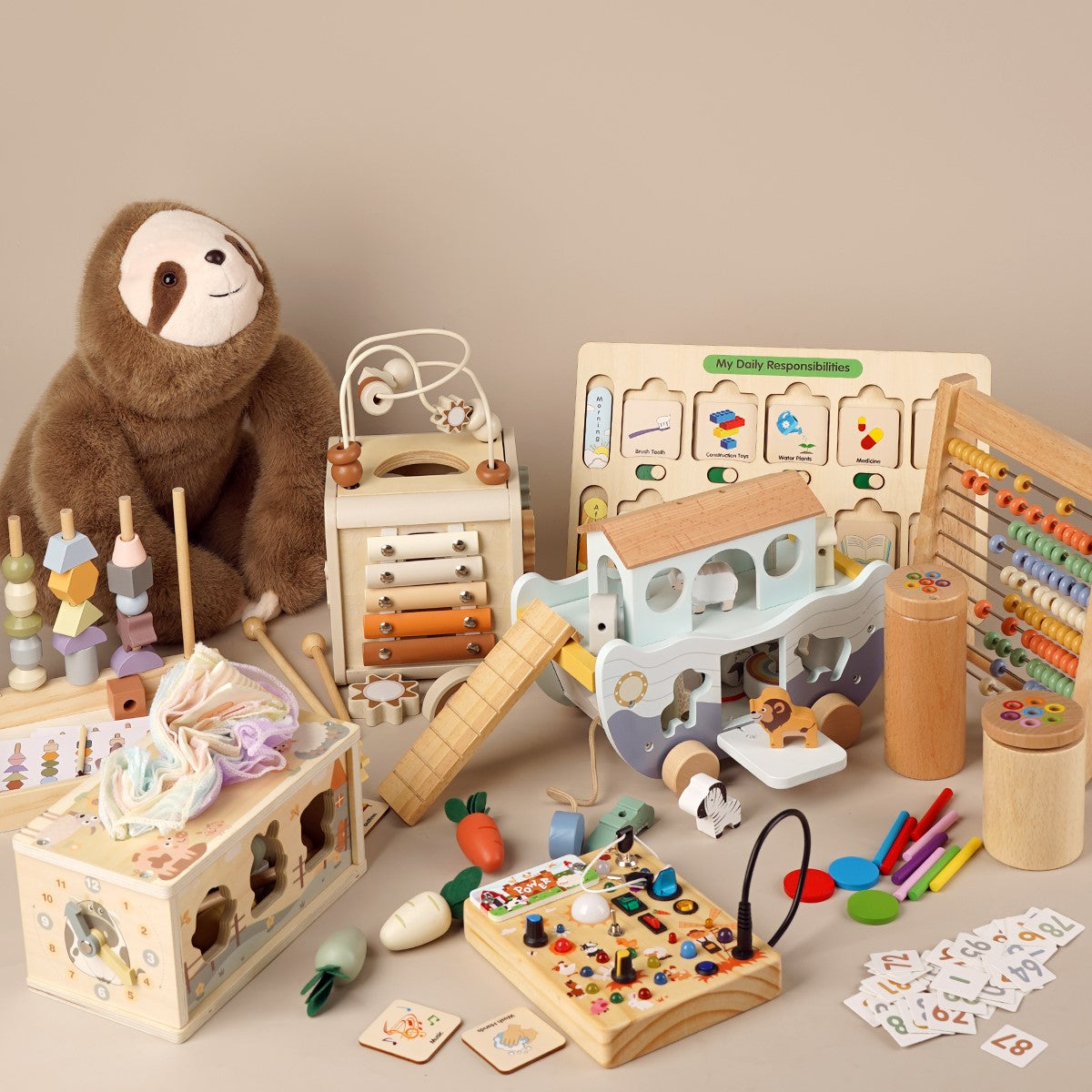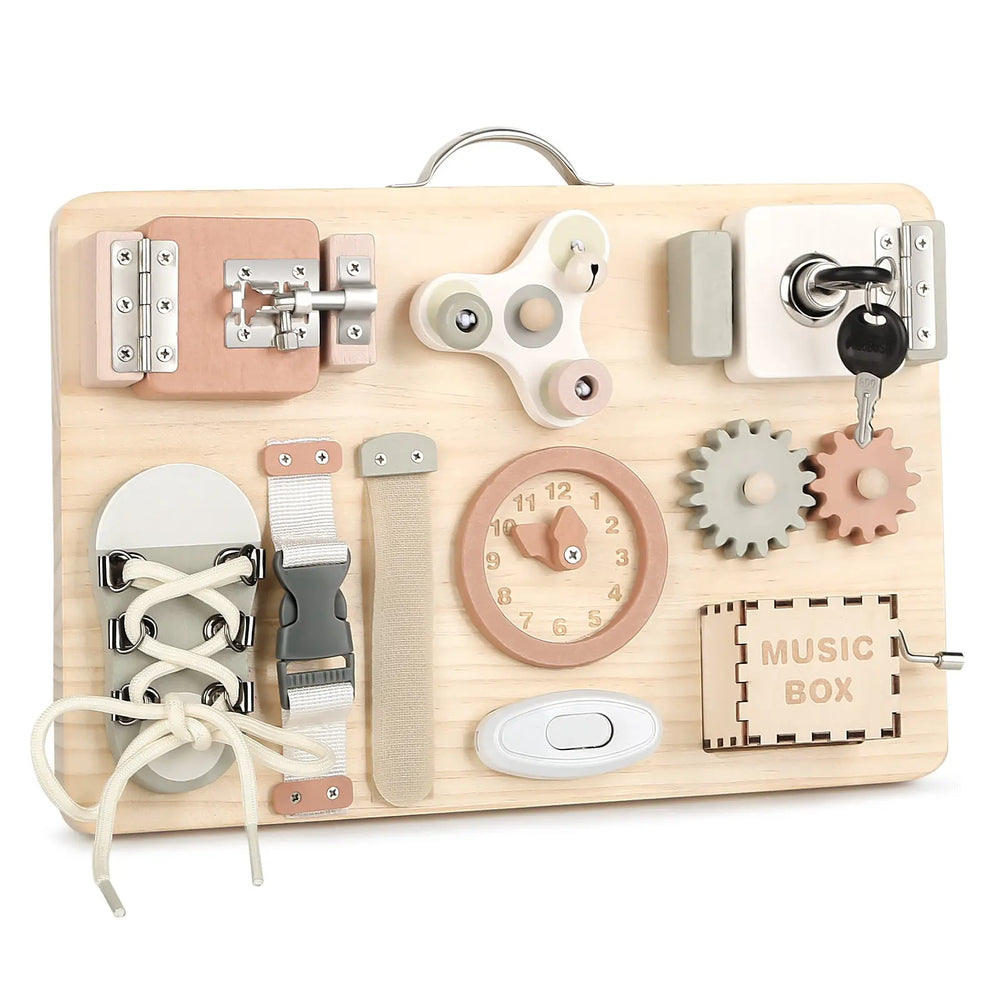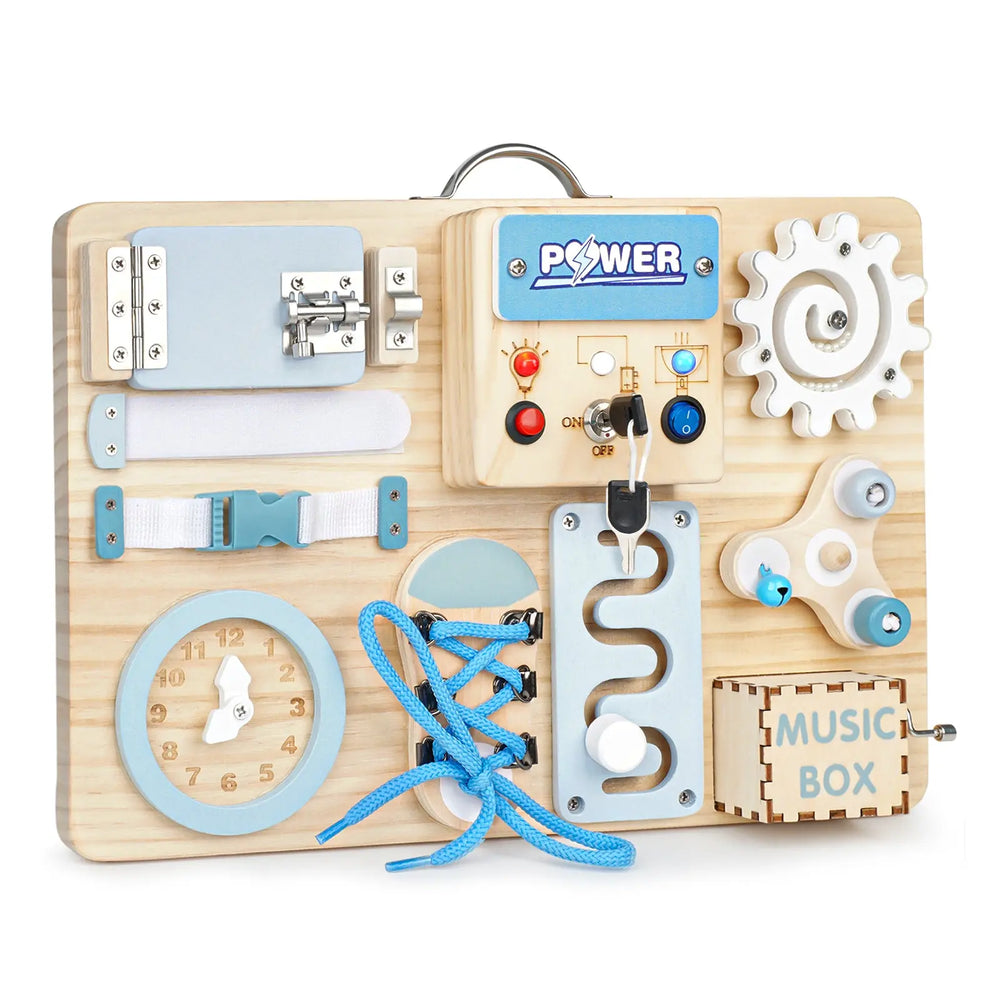Choosing the Right Montessori Toys for Autism
 Are Montessori Toys Beneficial for Children with Autism?
Are Montessori Toys Beneficial for Children with Autism?
Montessori toys are increasingly recognized for their potential benefits in supporting autistic children’s development. Grounded in Maria Montessori’s educational philosophy—emphasizing self-directed learning, sensory engagement, and skill-building through play—these toys align with many therapeutic goals for autism spectrum disorder (ASD).
Key Benefits of Montessori Toys for Autism
1. Sensory Integration
- Made from natural materials (e.g., wood, fabric), Montessori toys provide non-overstimulating tactile experiences, which are critical for children with sensory sensitivities.
- Activities like sandpaper letter tracing or sorting textured objects help regulate sensory input and improve focus.
2. Promotion of Independence
- Montessori toys are intentionally simple and purposeful, allowing children to engage in self-directed play. This fosters decision-making skills and reduces reliance on constant adult guidance.
- Example: A child practicing with a zipper board develops fine motor skills autonomously.
3. Structured Skill Development
- Toys like shape sorters, bead sequencing sets, or pouring kits target fine motor skills, hand-eye coordination, and problem-solving—areas where autistic children often need support.
- Activities mimic real-life tasks (e.g., buttoning, sweeping), enhancing practical life skills.
4. Adaptability
- Many Montessori toys are open-ended, enabling customization to a child’s developmental stage. For instance, stacking blocks can evolve from simple play to complex pattern-making.
5. Reduced Overstimulation
- Unlike electronic toys with flashing lights or sounds, Montessori toys minimize sensory overload, promoting calm, focused engagement.
Considerations and Limitations
| Factor | Explanation |
| Individual Variability | Not all autistic children respond similarly; some may prefer predictability over open-ended play. |
| Need for Guidance | While Montessori emphasizes independence, some children may require scaffolding to initiate play. |
| Abstract Thinking | Toys requiring imagination (e.g., symbolic play) may challenge children with rigid thinking patterns. |
Are Montessori Busy Board Good for Autism?
Montessori busy board (activity boards) can be highly effective tools for autistic children when tailored to their individual needs. These boards align with Montessori principles of sensory exploration, fine motor development, and independent play, which often overlap with therapeutic goals for autism.
5 Reasons Busy Boards Help Autistic Children
1. Fine Motor Skill Development
- Busy boards include fasteners (zippers, buttons, latches), knobs, and switches that require precise hand movements.
- Activities like turning a key or sliding a bolt strengthen hand strength, finger dexterity, and coordination—critical for tasks like writing or self-dressing.
2. Sensory Regulation
- Textured elements (e.g., sandpaper, fabric, rubber) provide tactile input, helping children self-regulate sensory needs.
- For sensory-seekers: Engaging with spinning gears or clicking latches offers calming repetitive motion.
- For sensory-avoidant children: Use boards with muted textures (e.g., smooth wood, silicone) to avoid overstimulation.
3. Problem-Solving & Cognitive Skills
- Boards often incorporate puzzles (e.g., matching shapes, unlocking mechanisms) that encourage logical thinking and cause-effect understanding.
- Example: A child learns that turning a dial clockwise releases a latch, reinforcing spatial reasoning.
4. Independence & Focus
- Self-directed play allows children to choose activities without adult intervention, fostering autonomy and task persistence.
- Structured tasks (e.g., "unzip the pouch to find a hidden toy") promote sustained attention and reward completion.
5. Real-World Skill Transfer
- Practicing with zippers, shoelaces, or locks on a busy board directly translates to daily living skills, boosting confidence in self-care.
Considerations for Autistic Children
| Factor | Guidance |
| Sensory Preferences | Avoid boards with flashing lights/loud sounds; opt for neutral colors and quiet materials (e.g., wood, silicone). |
| Complexity Level | Start with 3–4 simple activities, then gradually add challenges to match skill growth. |
| Safety | Ensure small parts (e.g., buttons, beads) are securely fastened to prevent choking hazards. |
| Individual Interests | Customize boards with themes (e.g., vehicles, animals) to motivate engagement. |
How to Optimize a Busy Board for Autism
1. Sensory-Smart Design
Incorporate elements like:
- Weighted knobs for proprioceptive input
- Fidget spinners or smooth rotary phone dials
- Fabrics with varying textures (velvet, faux fur)
2. Visual Supports
Add visual prompts (e.g., numbered steps, color-coded guides) to clarify tasks:
- Example: A red arrow pointing left to show "turn the bolt counterclockwise."
3. Therapeutic Pairing
- Use the board during occupational therapy (OT) sessions to practice grip strength or bilateral coordination.
- Pair with social stories (e.g., "First zip the bag, then open it to find a sticker").
4. Gradual Progression
| Stage | Activity Examples |
| Beginner | Large buttons, zippers, and basic shape sorters |
| Intermediate | Combination locks, shoelace threading |
| Advanced | Multi-step puzzles (e.g., unlock a door to reveal a compartment) |
Expert Insights
Occupational therapists frequently incorporate Montessori principles into autism therapy:
- Montessori materials offer graded challenges, letting children progress at their own pace while building confidence.
- Combining Montessori toys with structured therapies (e.g., ABA, speech therapy) can reinforce skill generalization.
Recommended Other Montessori Toys for Autism
1. Object Permanence Box
- Teaches cause-effect relationships and object permanence through repetitive, soothing actions.
2. Sensory Bin with Natural Materials
- Filled with rice, beans, or sand for tactile exploration, paired with scoops or cups for motor practice.
3. Wooden Puzzles
- Develop spatial awareness with puzzles featuring chunky, easy-to-grip pieces.
4. Dressing Frames
- Practice buttoning, zipping, and lacing to boost self-care skills.
5. Sound Cylinders
- Match auditory cues to improve listening discrimination and focus.
Final Thoughts
Montessori toys can be an excellent choice for autistic children due to their simplicity, focus on skill-building, and sensory-friendly designs. However, the key is observing the child’s interests and adapting as needed. By incorporating Montessori principles—along with any necessary supports—parents and educators can create a nurturing, engaging environment that fosters learning and independence.
Would you like recommendations for specific Montessori toys based on your child’s needs? Let me know in the comments!
Maybe it will be helpful for you:
Recent Post

From Letters to Language: Helping Nonverbal Kids Communicate with Joyreal AAC
Many parents notice something fascinating: “My child doesn’t talk b...

Buy Once, Play Longer with Joyreal Toys
“We’re tired of toys that only last a weekend.”“I want toys that gr...

Love Is Learning Together: Valentine’s Day Educational Toys by Joyreal
When we think of Valentine’s Day, our minds often drift to roses, c...

A New Year, A New Beginning: Joyreal Toys’ Wish for Every Child
A Heartfelt New Year Message from Joyreal Toys As we welcome 2026, ...

Can Montessori Wooden Toys Grow With Your Child From 1 to 4?
When Your One-Year-Old Plays for Two Minutes and Walks Away It’s a ...

Mini Piano or Drum Set — Which Is Best for Kids?
As parents, we all face the same struggle — our children spend hour...

Is Phonics-Based AAC Right for Your Nonverbal Child?
Why Nonverbal Children Need AAC Devices For many parents, finding a...

Picture-Based AAC or Phonics AAC? A Parent’s Guide
Phonics vs Picture-Based AAC: Which Communication Tool Is Right for...

How Does Music Enlightenment Work for Ages 0–3?
Why Age-Specific Music Enlightenment Matters (0–3 Years) The first...

What Age Is a Noah’s Ark Toy For?
Is a Noah’s Ark Toy Good for Toddlers (Ages 1, 2 & 3)? When par...










